Garma’s unlikely new boss Joel Ulbricht trades Elvis for Arnhem Land
Joel Ulbricht is best known for running the nation’s most famous Elvis Presley festival. He’s also white. Is he the right man to run Australia’s premiere Indigenous cultural event?
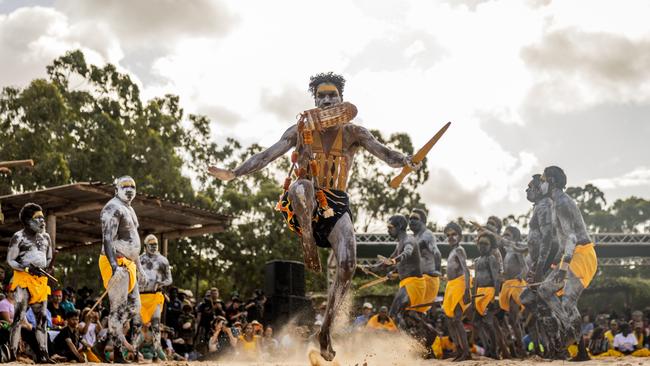
It’s a hot, dry and windy wet-season Saturday, and the restaurant at the Walkabout Lodge in Nhulunbuy is heaving with the lunchtime rush. In the outdoor eating area, birthday party balloons hang tight to a pole and kids squeal and jump in the pool.
Inside, a large group of women is dominating the restaurant. Dance mums, a local tells us. They are clearly in some sort of planning meeting, and as their talk turns to an upcoming event, the town’s newest resident Joel Ulbricht can’t help listening in from his table in the corner.
“I think they’re talking about insurance,” he says quietly, peeking at them from under the brim of his “Built like a Mack truck” cap.
Event management has been Ulbricht’s life, from when he was a teenager volunteering at music festivals right up to now as director of some of Australia’s biggest events. Five weeks ago he was in Parkes, NSW, running the town’s annual Elvis Festival. Two weeks after it wrapped he arrived here, in East Arnhem Land, to take up the job as festival director of Garma, Australia’s largest Indigenous cultural celebration showcasing Yolngu culture.
The two gigs seem poles apart – one brings in trainloads of Elvis lookalikes, the other attracts prime ministers – but Ulbricht sees it differently. No matter the content of an event, his role is to make it happen. “It’s an honour,” he says of his new gig. “The responsibility and influence of this festival … I’m not taking it lightly.”
When Ulbricht’s resume came across her desk last year, Denise Bowden breathed a sigh of relief. Bowden is a Tagalaka woman, born on Jawoyn soil in Katherine. In addition to her role as CEO of the Yothu Yindi Foundation, she had been the festival director for 12 years and she’d been looking for a successor for the Garma role for some time. Despite a vastly different profile from her own, Ulbricht was the man for the job.
“Joel has some excitingly unique, fresh and creative ideas he’s been exploring already,” she says. Ulbricht is talking about doubling the festival’s capacity, and making more of its education component; he’s also keen for visitors to spend more time learning from Yolngu and less time listening to politicians.
Started by Yothu Yindi frontman Dr M and his brother Yunupingu, the Indigenous rights activist, Garma began in 1999 as little more than a family get-together at the Gulkula ceremonial site, 40km from Nhulunbuy. “There were five white fellas who came. There were no tents, two cars, and a BBQ,” remembers Dr M’s daughter Dhapanbal Yunupingu. It has since grown to become the country’s premier Indigenous cultural and political event, and is usually sold out. In 2023, more than 5000 people came through the gate over the five days and last December Garma was rated as one of the top world events, says Bowden, up there with the Day of the Dead in Mexico, the Tour de France and Diwali in India.
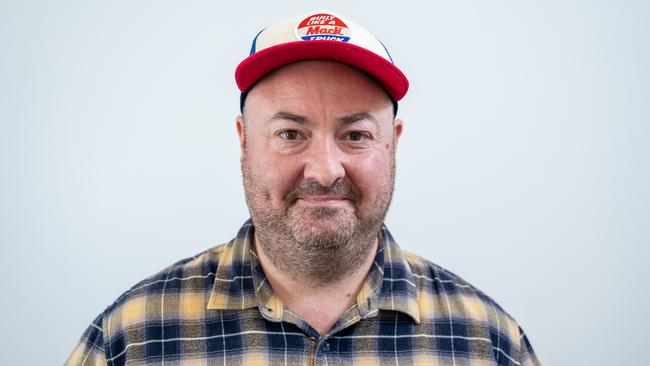
In addition to the traditional aspect, which includes miny’tji (art), manikay (song), bunggul (dance) and storytelling, it has also developed into a key forum for political and social issues affecting First Nations Australians. Over the past decade, Yunupingu (who died in April last year), Noel Pearson and Marcia Langton have used it as a platform to call for constitutional recognition. Celebrities often attend – you might spy author Richard Flanagan or musician Paul Kelly in the key forum audience, actor Simon Baker taking in the sunset bunggul or US Ambassador Caroline Kennedy standing quietly in the queue for a coffee. There’s a good bet you’ll run across actor Jack Thompson, too; he has been to all but two Garmas and was given the nickname Gulkula by the Yunupingu family.
Many politicians also fly north to be part of the Garma conversation and it’s usual for the prime minister of the day to attend. In 2022, Anthony Albanese was there to unveil the draft wording of the constitutional amendment for the referendum. Last year the festival was dominated by the Indigenous Voice to Parliament, and Albanese announced $6.4 million for the design and development of the Garma Institute, a tertiary and vocational education facility on country in northeast Arnhem Land.
That’s where Bowden is going. She remains Yothu Yindi Foundation CEO, and is shifting her focus to its education portfolio. “Our board and community leaders have been working towards the goal of locally run, locally owned education for more than 20 years, and I’m excited as we begin this next chapter,” she says. But Garma remains close to her heart. “People often ask me for my most memorable moment over the years, expecting me to say it was a speech by a Prime Minister or a visit from a notable person, and though those are memorable highlights, the one thing that puts a smile on my face above all else is watching kids grow up in the 12 years I’ve directed Garma, and bearing witness to the gathering of local families and their catching up and spending time with one another,” she says. “The concept of our Australian nation and community coming together has always been Garma’s lifeblood.”
Ulbricht is the second balanda (non-Indigenous person) to hold the role – Andrish Saint-Clare was director in 2011. The Yothu Yindi Foundation’s all-Yolngu board backed Ulbricht’s appointment out of a number of candidates. When asked about the selection of a non-Indigenous man as her successor, Bowden says: “He’s got amazing event co-ordination experience, and that’s not black or white.”
Ulbricht puts it this way: “I’m not here to stand on the stage, I am here to build the stage.” And there’s no doubt in his mind that this is exactly where he’s supposed to be. In fact, perhaps it’s what he’s been working towards for the past two decades.
Ulbricht’s desire to be an event manager dates back to the early 1990s, when he was a 12-year-old on his way home to the NSW Central Coast after attending a Christian youth concert in Sydney. There had been around 4000 people at the Sydney Entertainment Centre that day, and on the bus home all the kids were on a post-concert high talking about being musicians when they grew up. “Everyone was like, ‘Oh I want to be a drummer’, ‘I want to be a singer’, ‘Joel, what do you want to be?’ And I’m like, ‘I want to run the thing’.”
His teens were filled with volunteering at festivals, and a couple of years after he finished school his brother-in-law won the tender for Schoolies Week at the Gold Coast and Ulbricht threw himself into the team. Since then he’s managed corporate conferences, sporting tournaments, music festivals – even a hot-air balloon challenge. He’s toured Grammy award-winning American hip-hop star Lecrae. He’s lived in Hong Kong and New Zealand.
Ulbricht admits he rarely gets to take pleasure in the event itself, though he does enjoy the “adrenaline of festival mode”, explaining: “As a festival director, you don’t get a lot of good news when you’re actually in the heat of the weekend. You’re problem solving. It’s not for the faint-hearted … We often laugh, it’s like the Gordon Ramsay effect. We’re in the kitchen, it is messy, it’s all happening, but we’re delivering the best food.”
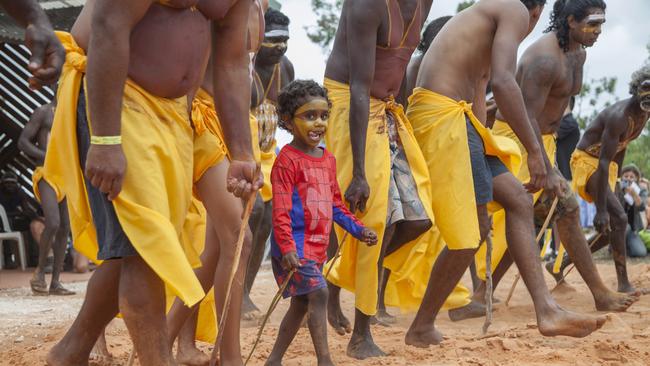
In 2018 Garma and the Elvis Festival crossed his radar at once. He’d applied for director jobs at both of them, but he’d also just signed on to run the Canowindra International Balloon Challenge – a community event that brought 8000 hot air balloonists to regional NSW.
Although there are many feathers in his Mack truck cap, Ulbricht is upfront about the bumps along the way: a festival in New Zealand that put him in debt, a pandemic that put a stop to his whole career. In February 2020 he packed his bags for Central Australia after taking a role running the Alice Springs Masters Games. Less than two weeks later, the borders shut. The event was cancelled and Ulbricht wasn’t sure what his next move was, so he got in touch with fellow Central Coast creative Ken Duncan whose foundation Walk a While worked in the Indigenous community of Haasts Bluff, 220km west of Alice Springs in the West MacDonnell Ranges.
Ulbricht says he knew little about First Nations Australians, but he’d always been interested in learning more and it was in his DNA to be “part of something bigger than myself”. Initially he offered to volunteer for Walk a While, but after a few weeks of hitting up potential donors over the phone, he suggested to Duncan that he move to Haasts Bluff. “What was meant to be three months was just shy of two years being out there,” he laughs.
Ulbricht’s move to this community of 125 people wouldn’t have surprised anyone who knows him. He grew up the second youngest of six children in a faith-based family, his parents both pastors. For a time they lived next door to the halfway house for men recently released from jail, run by his father. “I’ve always been very strongly aligned to things that make a difference,” he says. “For me, that’s what gets me out of bed in the morning – significance and purpose. Sometimes you will bleed yourself dry for the sake of a purpose … to raise significant funds for a particular project that’s going to benefit humanity, that you’re going to benefit someone else that’s above yourself or profits. For me, that feeling is why I will often burn myself out.”
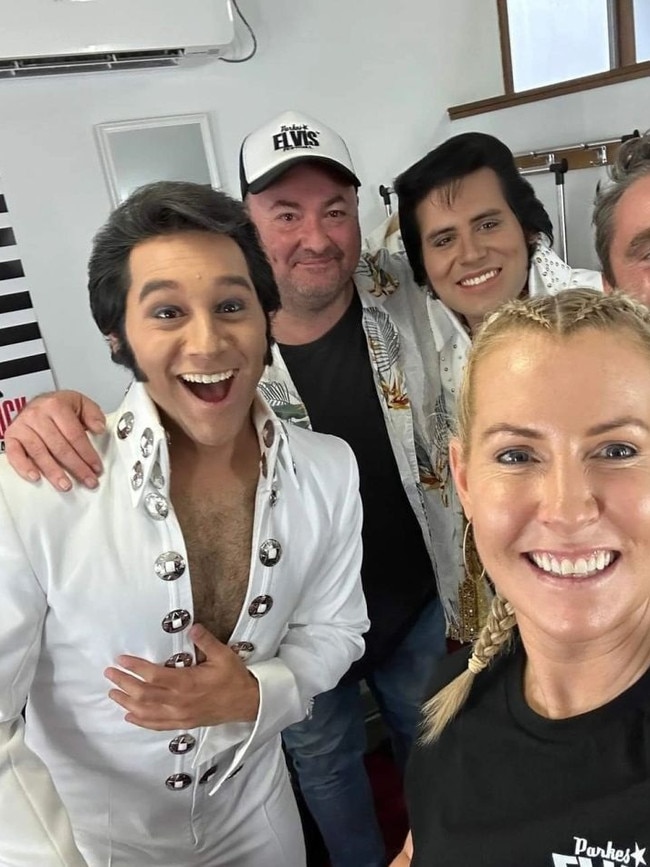
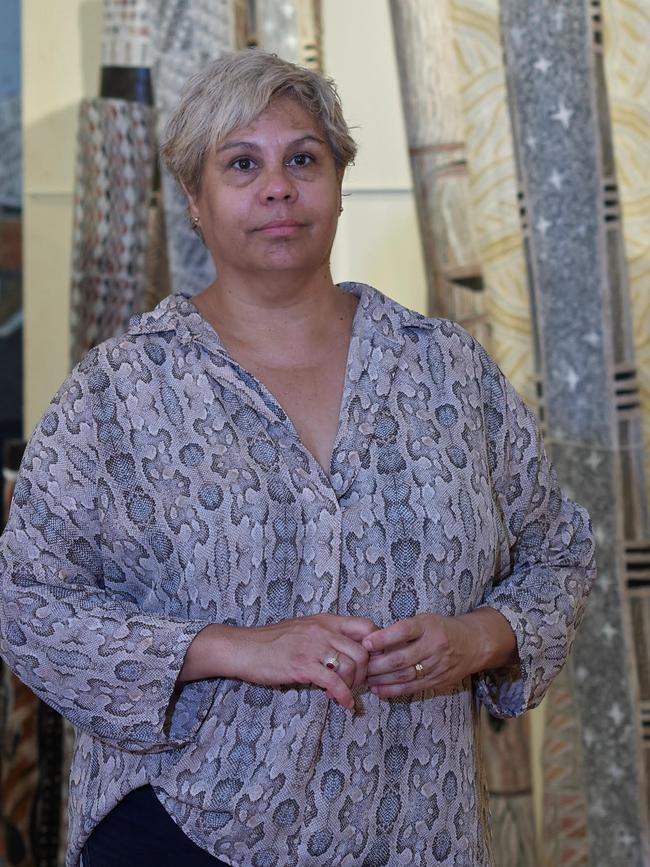
After Haasts Bluff there was a stint with Suicide Prevention Australia, organising its national conference, then last year he felt a pull back to his festival roots and began to look around at how the industry was rebuilding itself post-Covid. He put out feelers and in September an agency contacted him looking for someone to come on board at the Parkes Elvis Festival at the 11th hour.
In a strange coincidence, on his way to Parkes to start the job he got a phone call telling him the Yothu Yindi Foundation was looking for a Garma director. “It was deja vu,” he says, recalling the time in 2018 when both jobs had been on the table at the same time.
Make no mistake, this isn’t some clinical corporatisation of the nation’s most important Indigenous festival. Ulbricht missed the Northern Territory after his time in Haasts Bluff – “Once you get a bit of that red dirt into you, you can’t get it out of your blood” – and in the wake of the Indigenous Voice to Parliament he felt that Garma was more important than ever.
“I was heavily invested in learning so much about the referendum … it was such a great opportunity for a step forward,” he says. “I think on the back of the outcome, my fire was still there and I wanted to be part of contributing to the First Nations conversation.”
In the haze of hairspray and jumpsuits that comes with 25,000 diehard Elvis fans taking over Parkes, Ulbricht wrapped up the Elvis Festival in mid-January. This year the cult event raked in $10 million for the local economy and earned 1.87 billion mentions across 3,200 media outlets. He agreed to stay on with the Elvis Festival as a producer, then he signed up for the next five years of Garma and moved to Nhulunbuy.
“The conversations that Yothu Yindi Foundation are having at the moment have been really exciting,” he says. They’re looking ahead. “Already the board is saying, ‘What does our next 25 years look like?’”
In his third week of the gig, Ulbricht is careful not to look like he’s changing too much too quickly. “I’m a custodian of this festival, and as a balanda man I am here to serve the Yolngu people, to use my talent as a festival manager to magnify their wishes,” he says.
He’s clear, though, about his ambition to double the size of the festival to a daily capacity of 6000 people by 2030. “There are some real challenges with that in terms of … the need for more land, more camping, food, water and amenities, and ensuring we have the infrastructure and logistics in place to support it. But I want to open up the festival to more people. I want to open it up to the world. They know how to throw a proper party here in northeast Arnhem Land, so let’s invite more people.”
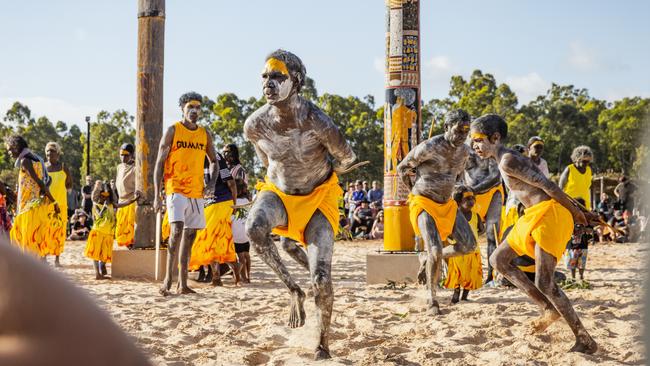
Education has always been an important part of the Yothu Yindi Foundation’s work, and Ulbricht wants to incorporate more of that into the Garma Festival. “We run a fantastic Youth Forum with students from all around Australia, including local schools, and I’m keen to integrate their activities with the broader program,” he says. “They’re the next generation, it’s their futures that are in our hands. And they’re the ones with the energy and the enthusiasm and the ideas – so why not inject some of that into the event more widely?”
Enter Djawa Yunupingu, who greets Ulbricht like an old friend when he pops into the Yothu Yindi Foundation office just off Nhulunbuy’s main drag. Trailing behind the chairman of the board is his almost 11-year-old grandson Sean, so deep in watching something on a smartphone that he walks into the coffee table. “He was in the paper this morning,” Djawa says proudly of Sean who, headphones in, is oblivious to being talked about.
Djawa says Sean is one of 38 students at Dhupuma Barker College, a partnership between the Yothu Yindi Foundation and Sydney’s Barker College. They make the news regularly, particularly for their robotics team which has competed internationally.
Djawa is here to discuss Ulbricht’s appointment, and Ulbricht offers to leave the room so we can talk about him, but it’s not necessary. It’s clear the two have become fast friends. “Joel brings in a lot of experience, and I’m so happy for him to be here,” says Djawa. When asked if he was familiar with some of Ulbricht’s previous work, he deadpans: “I was hearing he had left the building.” He cracks up with a husky, contagious laugh and the conversation turns to Elvis. Djawa remembers in the 60s his father had an old wind-up gramophone given to him by missionaries on which he’d play Elvis albums. Then in the 70s Djawa’s band Diamond Dogs, the predecessor to Yothu Yindi, included Elvis covers in their set. “We grew up with this music, rock ‘n’ roll,” he says.
Perhaps Parkes isn’t so far from Arnhem Land after all.
The board isn’t just getting Ulbricht up to speed for this year – there’s already excitement about 2025, Garma’s 25th year. (Although Garma began in 1999, two festivals were cancelled as a result of Covid.) They talk about the possibility of expanding the music offerings for 2025 – they could invite artists from all over the country, and maybe have a bush bands bash, too. Djawa throws up a wishlist the board has been putting together: Ian Moss. Jimmy Barnes. Warumpi Band. Tim and Neil Finn. John Fogerty is a favourite of Djawa’s, but he’d probably be busy, he says.
Like the rest of the board, Djawa is aware of how different this year’s Garma will be from the last, when the referendum was front and centre. At 2023’s welcome address, Djawa said: “I will be voting yes. I will be voting for my children’s future and your children’s future, connected together, in this ancient land, under the southern stars, walking side-by-side, living side-by-side.”
It was a chance in a million, he says, but now they have to move on.
–
“We just want to leave that behind. Clear the bushland, or put the fire in front of the grass, let it burn.
–
“New seeds come up, germinate the whole country. That’s what we want to do.” Reconciliation has always been Garma’s remit – “Garma” is a Yolngu phrase signifying a place where the freshwater and saltwater meet, intermingle and flow onward, which Bowden points out is a lovely metaphor for where things stand post-referendum.
Ulbricht says all eyes on Garma in August will give an opportunity to talk about where to now. “It’s a chance to discuss those difficult questions,” he says. “We might not have the answers, but we’re not afraid to ask the questions.
“Don’t get me wrong, there will always be a place for both sides of politics at Garma … the Key Forum will continue to be a home for serious policy discussion. But politicians already have plenty of other avenues to be heard, so let’s focus on the voices who don’t have that platform, and the features and activities that make Garma unique.”
The whole time we’re chatting, Sean is glued to his screen, and even though he’s not participating in this conversation he’s part of a much bigger one. The whole point of Garma, really, is him. Djawa believes the way forward is for Australians to come to the festival and learn from the Yolngu people. “Come and look at what you experience here or witness, and take back that experience – the festival itself, the talks that we have, but most of all the traditional dancing … take it back and talk to your friends and maybe bring them again next year.”
Ulbricht’s job is to get the people there, to deliver that experience. Djawa’s is to pave the way for the next generation. He looks at his grandson sitting quietly beside him. “I want him to get the best, to have the best education in life, to have opportunities. We need to make way for new kids like him to grow up to be strong and be the next leaders.” b
Garma 2024 runs from August 2 to 5. Tickets go on sale March 1, yyf.com.au


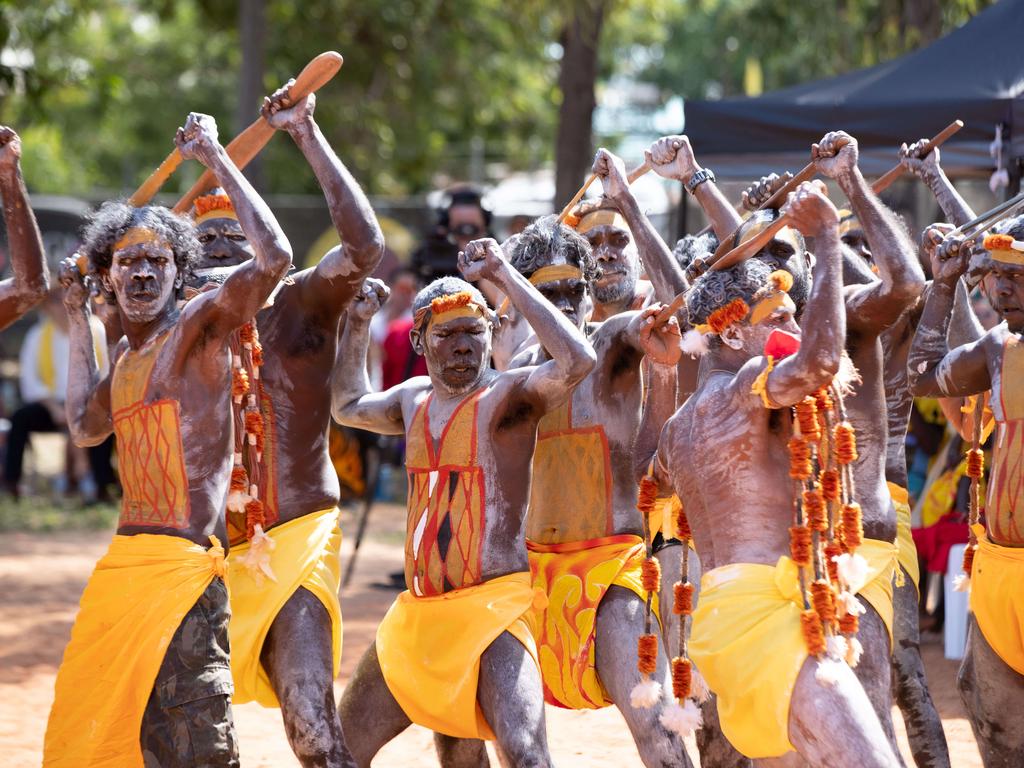
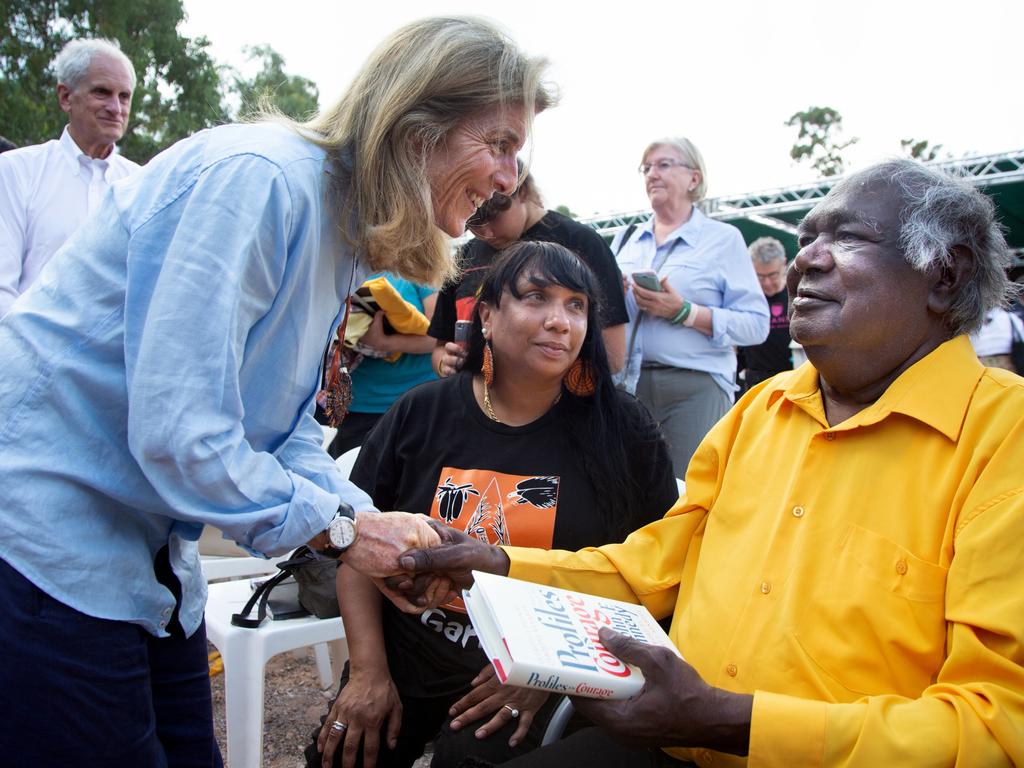

To join the conversation, please log in. Don't have an account? Register
Join the conversation, you are commenting as Logout